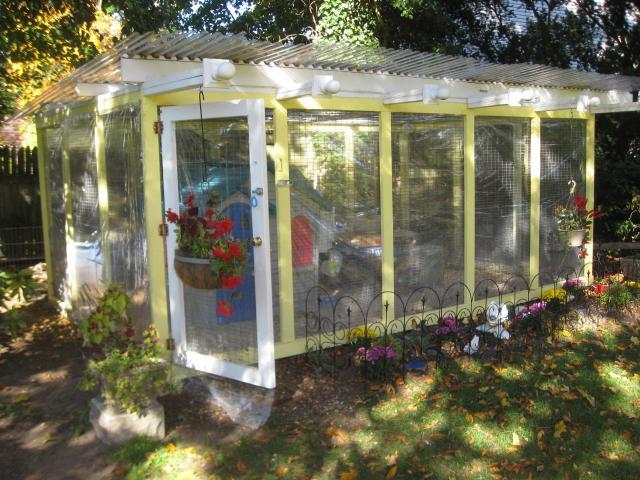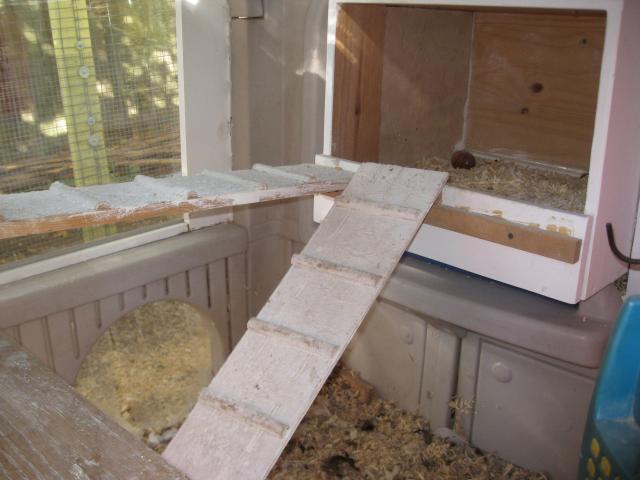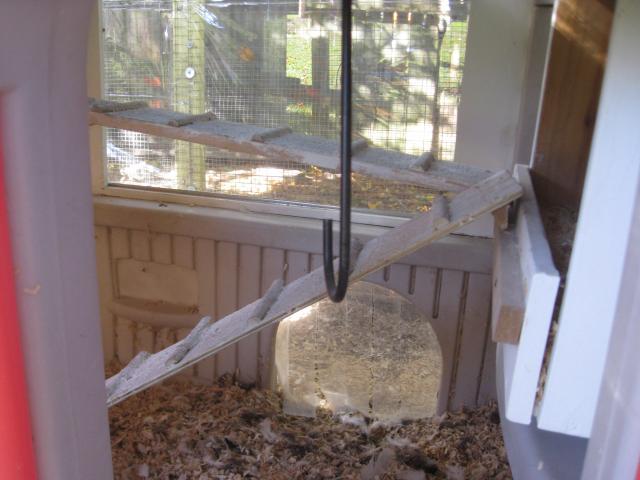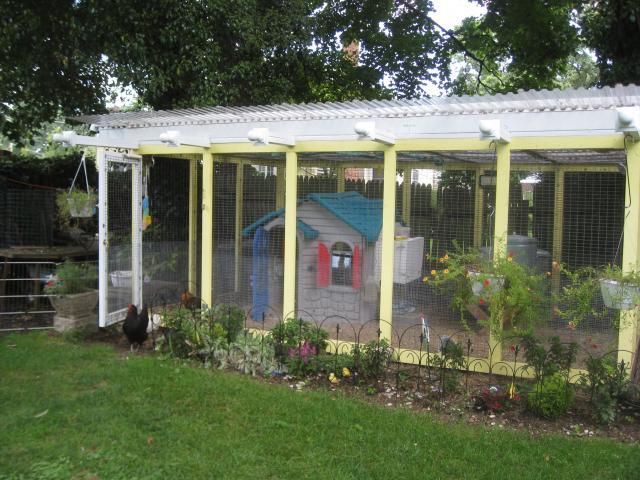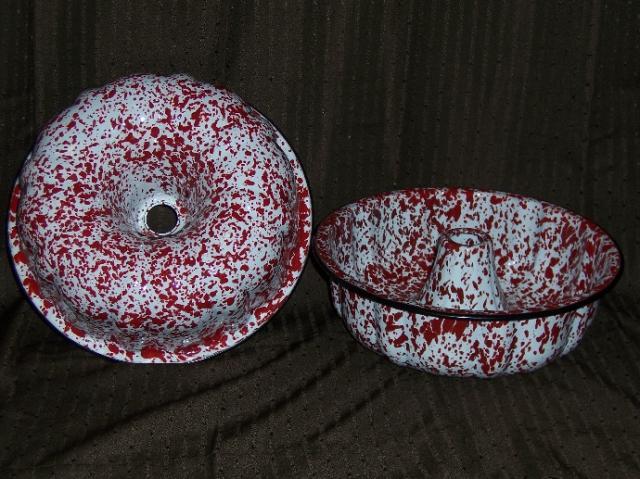Hi.
I've got a super cute converted plastic playhouse coop. It's about 4 feet by 4 feet square.
I've got it set up in a way that's super convenient for my three hens and it's also super convenient for me. The chickens are free to come and go from playhouse to run whenever they want, so I never have to be there to do any locking up at night or unlocking in the morning.
It's free-standing, right in the middle of the run. The run is 9 feet by 15 feet. None of the playhouse walls touch the run fencing at all.
The playhouse stands directly on the bare earth. No flooring of concrete, linoleum, plywood, or wire. Nothing. Just dirt.
I use the deep-litter method in the coop AND in the run.
I remove all the litter once a year, in the Spring. All that litter goes into the compost pile.
I start out with about two or three inches of pine shavings, and add more shavings about every six weeks or so throughout the year.
I sprinkle D E (food grade) on top of the shavings, liberally, every time I add more shavings.
I use a big leaf rake on the litter once a week or so. Just stirs it all up and makes it look all clean and neat.
The run is covered on all four side AND on top with heavy gauge welded wire.
The wire goes down into the earth for about eight inches and then flairs out in an underground apron for two feet.
Wood beams resting on top of the run's wire ceiling are taller in the front than in the back, to allow for a slanted rain barrier of corrugated clear plastic roofing panels. The roofing panels extend out beyond the run's walls about six inches all around.
The playhouse doors and windows are left open from early Spring until late Autumn; after the cold weather sets in, heavyweight clear shower curtain liners are installed on all four sides of the run with washers and screws.
After the cold weather sets in, the glass storm window is replaced in the playhouse, and the playhouse's "big" (child-size) door is shut closed.
After the cold weather sets in, a wind chill barrier of hanging strips of soft plastic are hung over the small (chicken-sized) door. The hens walk right through the strips with no problem.
For ventilation in the playhouse, the two halves of the playhouse roof were deliberately positioned with a large four-inch gap between them at the peak.
For ventilation in the run after the shower curtains completely seal the four sides, the entire ceiling is still wide open and clear. The gap to the roofing panels at the front of the run is about eight inches, and decreases to about two inches at the back of the run.
After cold weather sets in and the shower curtains are in place, NO rain gets into the run, and NO rain can therefor get into the playhouse.
In the warm seasons, when there are no shower curtain panels in place, if there is a rainstorm with wind, then rain DOES get about six inches into the run along the windward side of the run, IF the rain is wind driven. If it rains without wind, the run stays dry. With or without wind, no rain reaches so far in as to reach the playhouse.
Two or three minutes is all it takes to rake through and stir up and smooth out the litter and any rain-soaked shavings quickly dry in the warmth of the sun when the rain stops.
I keep a long-handled barbecue scraper tool hanging inside the run. I use it every morning to scrape off any poo that might be on the roost board. The inside of the playhouse is kept pristine clean and there are NEVER any smells in the playhouse OR in the run.
To prevent flies, I use two deterrents: the little yellow tree-shaped, vanilla scented, deodorant cardboards that are sold for hanging in automobiles, and the glass jars called Fly Traps. I keep one or two vanilla cardboards hanging INSIDE the run, and I've got one Fly Trap jar hanging OUTSIDE on the left side, and one on the right side, of the run, way in the back behind the run. Those Fly Traps are stinky if you get up close to them, but that's what attracts over 20,000 flies in about three or four weeks. I toss the jars and put up new ones all summer until fly season is over. They're about $8 apiece. Worth it to me!
We just finished about seven days of torrential heavy, heavy, constant rains here and our playhouse floor stayed completely dry; lots of wet litter on three sides inside the run, but the sun's out today, FINALLY, and it'll all be dry by tomorrow. NO MOLD EVER.
No heat is needed in the cold season; no air conditioning or fans are needed in the warm seasons.
Food and water are in two enameled metal bundt pans set on the floor inside the run, on the outside of the playhouse, underneath the nest box overhang.
To keep the water from freezing in the winter, I bury a covered cookie tin in the earth under the water pan. The cookie tin holds a mug warmer with its wire coming out the side of the tin and connected to a heavy duty extension cord that hangs down from the ceiling of the run. The other end is plugged into a socket on the patio.
Here are some photos, current and from last year:
With shower curtain liners in place:
Curtains have been removed:
Here you can see the little chicken door with the hanging plastic strips:
and here:
Here you can see the ventilation gap at the playhouse roof peak, and you can see the storm window in place at the rear of the playhouse:
I keep three large metal trash cans inside the run on top of that wooden table next to the playhouse. One holds the Purina Layeena crumbles, one holds bags of treats (Black Oil Sunflower Seeds, pumpkin seeds, high protein kitten food pellets, and a box of dry cereal that we don't want to eat any more of; and one metal can holds scratch for cold weather afternoon treats.)
The big door to the run is left open all day when we're home and the hens free range in the grass covered back yard all day.
They have bushes and trees and shrubs to rest under for shade, and lots of sunny grass areas to bask in at will. They make wonderful hen-sized dust bath hollows at the base of the trees and the shrubs. I sprinkle DE in the hollows once a week or so.
Their free-range area in the backyard is enclosed with soft green landscaping fencing held in place by skinny metal vertical rods every ten feet or so. The fencing is four feet high. No covering on top. Property is entirely fenced so no dogs can get in. I once saw a cat walk through, but scared heck out of it and it's never returned. The raccoons come out EVERY SINGLE NIGHT in the warm season, but the girls return to the run well before dusk all on their own and I lock the big people door of the run with a padlock and key.
The bundt pans:
The mug warmer:
The nest box side of the playhouse:

